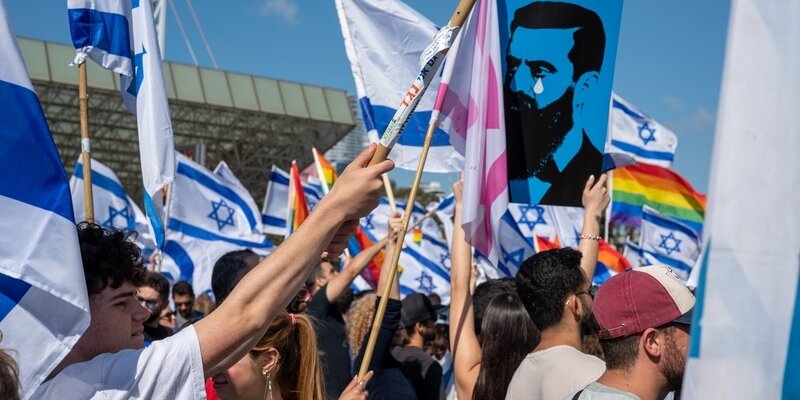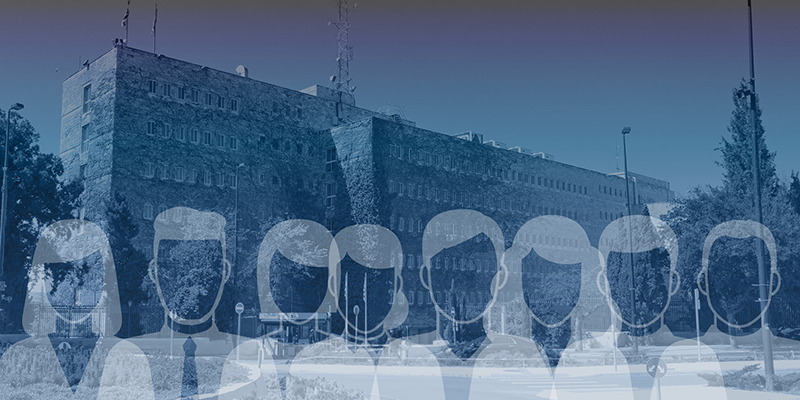Ultra-Orthodox Zionists: Will this Election Expose a Tacit Change in Haredi Society?
Opinion polls are predicting many floating voters in the ultra-Orthodox community will vote for the far-right Otzma Yehudit party reflecting the processes and changes that are taking place, deep below the surface, within ultra-Orthodox society. A combination of increased nationalism, anger at the leadership in the aftermath of the Meron disaster and their handling of the coronavirus pandemic, as well as outrage over the exposure of sexual harassment scandals, is leading many Haredim to look for a political alternative to their aged representative in the Knesset. ‘The traditional Haredi issue is on the agenda in any case, and someone will take care of it,’ explains one ultra-Orthodox Jerusalemite. ‘I won’t vote for United Torah Judaism again; I’ll vote for someone else who has similar views to me – and that’s Ben-Gvir.’ A Shomrim analysis


Opinion polls are predicting many floating voters in the ultra-Orthodox community will vote for the far-right Otzma Yehudit party reflecting the processes and changes that are taking place, deep below the surface, within ultra-Orthodox society. A combination of increased nationalism, anger at the leadership in the aftermath of the Meron disaster and their handling of the coronavirus pandemic, as well as outrage over the exposure of sexual harassment scandals, is leading many Haredim to look for a political alternative to their aged representative in the Knesset. ‘The traditional Haredi issue is on the agenda in any case, and someone will take care of it,’ explains one ultra-Orthodox Jerusalemite. ‘I won’t vote for United Torah Judaism again; I’ll vote for someone else who has similar views to me – and that’s Ben-Gvir.’ A Shomrim analysis

Opinion polls are predicting many floating voters in the ultra-Orthodox community will vote for the far-right Otzma Yehudit party reflecting the processes and changes that are taking place, deep below the surface, within ultra-Orthodox society. A combination of increased nationalism, anger at the leadership in the aftermath of the Meron disaster and their handling of the coronavirus pandemic, as well as outrage over the exposure of sexual harassment scandals, is leading many Haredim to look for a political alternative to their aged representative in the Knesset. ‘The traditional Haredi issue is on the agenda in any case, and someone will take care of it,’ explains one ultra-Orthodox Jerusalemite. ‘I won’t vote for United Torah Judaism again; I’ll vote for someone else who has similar views to me – and that’s Ben-Gvir.’ A Shomrim analysis
MK Itamar Ben-Gvir (right) and MK Aryeh Deri with MK Moshe Gafni. Photos: Reuters, Bea Bar Kallos

Chen Shalita
October 3, 2022
Summary


Listen to a Dynamic Summary of the Article
Created using NotebookLM AI tool
Whether they are moving in the direction of Itamar Ben-Gvir, or toward Benjamin Netanyahu and Benny Gantz, there is little doubt that the changes that ultra-Orthodox society is undergoing are manifesting themselves in the voting patterns for Israel’s upcoming general election. According to the latest predictions, the percentage of ultra-Orthodox Israelis voting for parties that are not, by definition, Haredi – in other words, any party other than United Torah Judaism or Shas – will rise in this election. The biggest winner is expected to be the Religious Zionism slate, under the leadership of Bezalel Smotrich and Itamar Ben-Gvir. According to polls, ultra-Orthodox voters could give the far-right party an extra two seats in the next Knesset.
This connection between religion and the far right has been happening gradually over several years, but polls conducted ahead of this election appear to indicate an acceleration of the process. Academics believe the phenomenon has additional ramifications beyond transferring seats between parties in the Knesset. “You can see the process in the ‘hilltop youth,’” says researcher Neri Horowitz, who is chairman of Agora Policy, which also advises the defense establishment. “It’s no longer just the settler youth, who were born and raised in the territories, it’s now made up of graduates from the Haredi education system. Last month, the IDF arrested the great-grandson of two revered rabbis – Rabbi Kanievsky and Rabbi Steinman – on suspicion of setting up a laboratory in his room at the yeshiva in Modi’in Illit, which allegedly sought to arm ultra-Orthodox youth to carry out ‘price tag’ attacks. He talked in terms of an underground. That’s an important example of the phenomenon I have been warning about. We cannot afford to ignore this trend.”
Dr. Ari Engelberg, a sociologist who lectures in Tel Aviv University’s Religious Studies program and who has investigated the Jewish supremacist organization Lehava, also spoke about these connections. “It’s no coincidence that the Hara’ayon Hayehudi yeshiva, affiliated with the Kahane movement, is located in an ultra-Orthodox neighborhood of Jerusalem. It’s a comfortable location. And they are attracting students. It is not a very active yeshiva. There are a few lessons here and there in the afternoon, but I see that ultra-Orthodox go there, too. Ultra-Orthodox yeshiva dropouts were also involved in the riots in May 2021, or, as they referred to them in right-wing Haredi circles, the 5781 Pogroms.”
The vast majority of those representing the ultra-Orthodox community in the Knesset are older men who have been in parliament for many years. In some parts of Haredi society, the extent of which it is hard to gauge, a lot of anger has built up toward those elected officials in recent years. Hila Hassan Lefkowitz, the head of the Kfar Yonah Religious Council, and Esti Shoshan, a journalist, and CEO of the Nivcharot movement, which seeks to promote Haredi women in the Knesset and other decision-making centers, say that there are three milestones in the context, which could influence how people vote on Election Day: the coronavirus pandemic, of which more later, the Meron disaster and the Chaim Walder scandal.
“Forty-five people were killed in the Meron disaster,” says Hassan Lefkowitz, “but the leadership did not only fail to go to the site of the tragedy, but they also said that it was preordained, that we cannot try to understand things that are beyond us, that what happened was supposed to happen – and that the victims were martyrs. Now that the commission of inquiry is hearing about all the deals and how, instead of looking after people’s safety, they argued over who would get a place close to the table – we understand that they neglected the public in favor of wheeler-dealers.”













